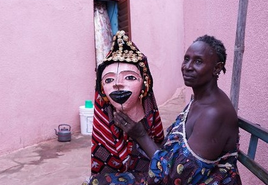Books and Arts
《图书与艺术》版块
Art, gender and conflict
艺术、性别和冲突
The puppet-mistress of Mali
马里的木偶女王
The struggles of the only female practitioner of a venerable art form
古老艺术形式唯一女性传承者的奋斗史
Each Morning Maoua Koné wakes beneath the black-eyed gaze of masks and marionettes on the walls of her cramped one-room flat in Bamako.
每天早晨, Maoua Koné都在巴马科狭小的人单人公寓墙上的面具和牵线木偶的黑眼睛的注视下醒来。
When Ms Koné, Mali’s only female marionettist, manipulates the shiny forms, her male counterparts tremble.
Koné是唯一的女性木偶表演艺术家,当她操纵闪亮的小玩意儿,男性表演家都为之震颤。
“The men are scared of me because they think I have a lot of magical powers,” she says.
“男性都惧怕我因为他们认为我有魔力,”她说。
“They think it is not possible for a woman to be a marionettist.”
“他们认为女性不可能成为木偶演奏家。”
Her career has overcome chauvinism, only to be stifled by another stubborn obstacle: violent conflict.
她的事业克服了大男子主义,最终却被另一顽固障碍压制:暴力冲突。
Mali’s marionette theatre originated centuries ago in the villages of Bozo fishermen and Bambara hunters in southern and central regions.
马里的木偶戏剧院起源于几个世纪前中、南部地区博佐渔民和班巴拉猎人的村庄。
The custom co-existed with Islam, the main religion, which has historically forbidden figurative representation of human beings.
这一习俗与主要宗教伊斯兰教共存,而伊斯兰教禁止用比喻形象代表人类。
Performances explore communities’ histories, tell morality tales and limn the roles of men and women.
木偶戏表演探索社区历史、讲述道德故事,并限定男女角色。
They celebrate the coming of the rains and of the harvest.
主要为庆祝雨季和收获的到来。
Masks and puppets stand in for people and animals, but also character traits, spirits and ancestors.
面具和木偶代表着人和动物,也代表着人物特征、幽灵和祖先。
The puppet-mistress of Mali.jpg
The country’s rich cultural life has always been segregated by gender.
马里丰富的文化生活总是被性别隔离开来。
In the renowned music scene, for example, women rarely play the djembe, a kind of drum, or the kora, a lute-like instrument.
例如,在著名的音乐界,女性很少演奏金贝鼓(非洲手鼓)或科拉琴(类似琵琶的乐器)。
Women have traditionally been forbidden from operating marionettes, or even making them, a craft that entails complex rituals, conducted under cover of night and involving kola nuts and roosters.
传统上,女性不允许操作木偶,甚至制作也不被允许,制作包含复杂的工艺,要在夜幕的掩护下,原料涉及可乐果和公鸡。
In these ceremonies, says Broulaye Camara, a fellow marionettist, male initiates determine whether a puppet’s spirit will be benevolent.
在这些仪式上,木偶表演家布劳莱卡马拉说,男性制作人会决定木偶的灵魂是否仁慈。
Women are barred, Mr Camara maintains, because they have not been initiated, and because they are gossips.
卡马拉先生坚持认为,女性被禁止是因为他们还没有基本的知识,还因为她们爱说长道短。
“Women talk too much,” he says. “They don’t keep secrets.”
“女性话太多,”他说。“他们不能保守秘密。”
Ms Koné, a tall 60-year-old with cropped greying hair, says the men have nothing to worry about.
Koné女士60岁,高个,灰白短发,她认为男性没什么好担心的。
Her marionettes do not have spirits or powers because they are “modern”, made of clay and papier-mâché rather than wood.
她做的木偶没有灵魂或超能力,因为这些木偶是“现代的”,使用黏土和纸胶混合物制成,而非木头制作。
She abjures the old-fashioned kind.
她正式宣布放弃过时的做法。
“I would never touch them,” she says.
“我永远都不会用那种方法,”她说。
“The marionette itself couldn’t do anything, but the men around it could do very bad things.”
“木偶本身做不了什么,但木偶周围的人却可以做非常坏的事。”
She grew up in Koulikoro, about an hour from Bamako on the banks of the Niger river, a town known for its marionettes, masks and unique, sacred statuettes that represent the dead.
她在库利科罗长大,从巴马科到尼日尔河岸边大约一个小时,这座城镇以木偶、面具和代表死者的独特神圣雕像而闻名。
She was born into a noble family in Mali’s complex caste system, rather than an artistic one, and her parents did not support her ambitions.
她出生在马里复杂的种姓制度下的一个贵族家庭,并非艺术世家,她父母也并不支持她的雄心壮志。
“It was difficult for my family to accept,” she says.
“我的家人都很难接受,”她说。
Of 12 siblings, she is the only artist, and the only daughter who chose not to have children, believing they would hamper her career.
在12个兄弟姐妹中,她是唯一的艺术家,也是唯一一个选择不生孩子的女儿,因为她认为孩子会妨碍她的事业。
Coming of age in the early decades of independence, she was a beneficiary of the investment in the arts made by Modibo Keïta, Mali’s first president (from 1960-68).
在马里独立后的最初几十年里,她受益于第一任总统莫迪博·凯塔(1960-68在任)对艺术的投资。
His government “understood that the arts were a very important part of creating a national identity and bringing people together,” says Mary Jo Arnoldi, a curator at the National Museum of Natural History in Washington and an expert on marionette culture.
凯塔的政府“明白艺术是创造国家认同和把人民团结在一起的重要组成部分,”华盛顿国家自然历史博物馆馆长、木偶文化专家玛丽·乔·阿诺尔迪表示。
Ms Koné was educated at the National Institute of the Arts (INA), a cutting-edge college that, says Ms Arnoldi, “broke down gender and caste boundaries” and produced some of Mali’s finest artists.
Koné女士曾在国家艺术学院上学,阿诺尔迪说,“这是一所前沿大学,打破了性别和种姓歧视,”诞生了马里最好的一批艺术家。
Ms Koné has broken many taboos herself.
Koné女士自己也打破了很多禁忌。
She made sculptures of torn vaginas to illustrate the harm of genital cutting,
她制作撕裂的阴道雕塑,以说明切割生殖器的危害,
statues depicting domestic violence
还制作描绘家庭暴力的雕像,
and satirical figurines of women wearing full veils—a burgeoning practice in Mali, of which she disapproves.
还有带有讽刺意味的戴着面纱的妇女雕像——在马里戴面纱是一种新兴的做法,她对此表示反对。
For all his scepticism, Mr Camara performed with her in the national marionette troupe in the 1990s, when urban companies educated Malians on subjects such as HIV and child labour.
20世纪90年代,尽管卡马拉先生心存疑虑,但还是在城市公司在给马里人做类似艾滋病和童工的普及教育时,和她在国家木偶剧团同台演出。
This artistic progress has been violently interrupted.
但这种艺术的进步被粗暴地打断了。
After a partial jihadist occupation in 2012, followed by a coup d'état, foreigners no longer attend Ms Koné's performances and workshops.
马里在2012年被圣战分子部分占领后,紧接着又发生了政变,外国人不再参加Koné女士的演出和工作坊。
Invitations from European festivals and schools have dried up.
欧洲节日和学校的邀请也渐渐少了。
Donors have diverted funds to the security services.
捐助者已经将资金转移到安全部门。
(Around 14,000 UN peacekeepers remain in Mali; ethnic strife still bubbles.)
(约1.4万名联合国维和人员留在马里;民族冲突仍然存在。)
“Europeans are frightened to invite us,” Ms Koné says;
“欧洲人害怕邀请我们,”Koné女士说道;
and “because there are explosions and people are being killed here, they won't come.”
“因为这里发生了爆炸,有人被杀害,所以他们不会来。”
Fodé Sidibé, director of Mali's annual marionette festival, thinks the current government and donors should sponsor the arts to promote peace in a divided country.
马里一年一度的木偶艺术节的负责人弗德•西迪贝认为,现任政府和捐赠者应该赞助艺术活动,以促进分裂国家的和平。
“The political establishment don't understand the value of culture,” Mr Sidibé says.
“政治体系不理解文化的价值,” 西迪贝先生说。
“The security problem will not be solved with arms, but with arts.”
“安全问题用武力解决不了,得用艺术。”
These days, though, Ms Koné's avant-garde troupe—named “Torch of Liberty”—rarely have a chance to perform.
尽管近日,Koné女士前卫的剧团——叫做“自由火炬”——很少有机会表演。
But they still meet every evening in the INA's courtyard, where they mould marionettes for a show they may never stage.
但他们仍然每天晚上在艾娜的院子里聚会,在那里,他们为一场他们可能永远不会登台的演出制作木偶。
来源:经济学人

参与评论